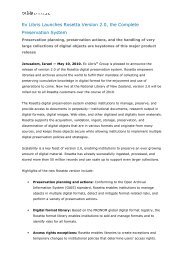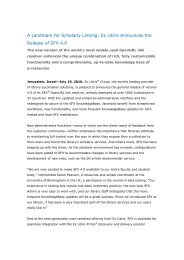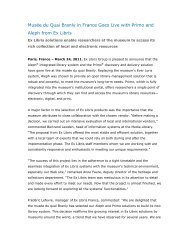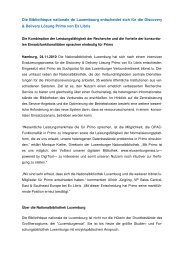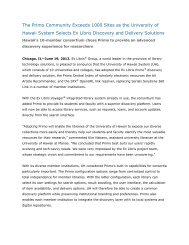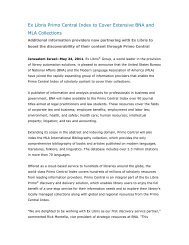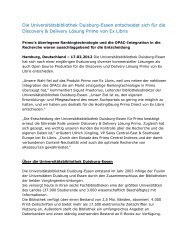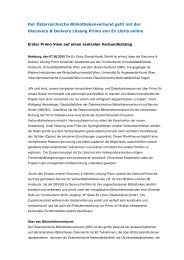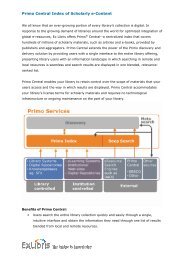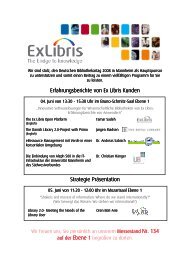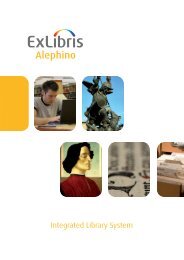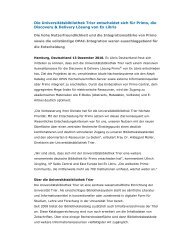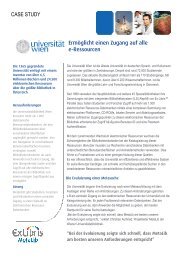April 2005 Issue - Ex Libris
April 2005 Issue - Ex Libris
April 2005 Issue - Ex Libris
Create successful ePaper yourself
Turn your PDF publications into a flip-book with our unique Google optimized e-Paper software.
2003, and developed by EDINA at the University of Edinburgh<br />
in partnership with <strong>Ex</strong> <strong>Libris</strong>, SUNCAT has achieved a critical<br />
mass of just over four million records. These are made up of<br />
records from national libraries, the largest UK academic<br />
library collections, and international databases. Phase 2 of<br />
the programme, which will see coverage of the catalogue<br />
extend to up to 60 new libraries across the UK, has also been<br />
funded by JISC and is now underway.<br />
SUNCAT will also be developed to integrate fully with other<br />
services on serials within the JISC information environment,<br />
supporting work in the areas of electronic subscription<br />
information, online access to journals, electronic document<br />
delivery, e-theses, and repositories, amongst others. As such,<br />
SUNCAT will further develop as a key tool for researchers,<br />
librarians, and others within colleges, universities, and beyond.<br />
The official launch of SUNCAT took place on 15th February<br />
<strong>2005</strong> at The Law Society, London. Following the welcome<br />
and introduction by Derek Law (Librarian and Head of<br />
Information Resources Directorate, University of Strathclyde),<br />
Derek and Ronald Milne (Acting Director of University Library<br />
Services and Bodley’s Librarian, University of Oxford) discussed<br />
the origins and vision of SUNCAT and were followed by<br />
Peter Burnhill (Director, EDINA), Hugh Taylor (Head, Collection<br />
Development and Description, Cambridge University Library),<br />
and Andrew Green (Librarian, National Library of Wales) who<br />
discussed their experiences to date. Peter continued by<br />
outlining the processes for phase two of SUNCAT before<br />
the audience toasted the success of SUNCAT at a reception<br />
hosted by Reg Carr (Director of University Library Services<br />
and Bodley’s Librarian, University of Oxford).<br />
To access the pilot SUNCAT service and for further information,<br />
please go to: http://edina.ac.uk/suncat<br />
- 10 -<br />
The Bavarian Central Union Catalog<br />
Project Goes Live<br />
With the entrance of electronic data processing into<br />
libraries in the 1970s, a requirement arose for a<br />
descriptive cataloging system based on the shared<br />
creation and reuse of cataloging records. This led to the<br />
formation of library networks in some of the German states.<br />
In 1983, the German Consortium of Library Networks was<br />
established based on the Deutsche Forschungsgemeinschaft<br />
(DFG) recommendations for the development of regional<br />
networks. The chief tasks of the Consortium were the<br />
coordination and introduction of common, innovative library<br />
services based on general hardware, software, and data<br />
communications standards; coordination and application<br />
of library codes and standards for cooperative cataloging,<br />
indexing, interlibrary loans and data exchange; as well as<br />
the representation of Consortia members’ interests within<br />
official bodies and institutions. By developing these consortia,<br />
German libraries began extending their services to remote<br />
users, expanding resource offerings, and supporting initiatives<br />
such as distance education. Library network centers and Die<br />
Deutsche Bibliothek—the German National Library, and the<br />
Austrian Library Network cooperate within the Consortium<br />
of Library Networks.<br />
A number of consortial models have been developed to<br />
meet the requirements of these different regional units. One<br />
of the most basic requirements is a union catalog developed<br />
to enhance the specific workflow needs of each consortium.<br />
ALEPH Cluster, <strong>Ex</strong> <strong>Libris</strong>’ unique, ever-expanding set of<br />
products designed to meet the complex functionality and<br />
service requirements of multi-site libraries, aids organizations<br />
that form one unit based on geographic proximity,<br />
institutional linkage, subject matter, or any other defined<br />
need; to share bibliographic data, users' data, and end user<br />
services while preserving the degree of autonomy required<br />
by each local member.<br />
The summer of 2004 saw the successful migration of the<br />
State of Bavaria system from an old mainframe Central Union<br />
Catalog to ALEPH 500. This project, which began in February<br />
2003, involved the conversion and migration of 13,000,000<br />
title records and 7,000,000 authority records. In order to<br />
facilitate the move to ALEPH 500, 270 librarians were trained<br />
in a “train the trainer” method so that today there are<br />
approximately 800 ALEPH 500 catalogers in the State of<br />
Bavaria. The ALEPH 500 system runs on a SUN cluster<br />
environment based on 2 SUN V1280 and 2 SUN V880. The<br />
software “agents” required for this system were developed<br />
during the course of the project.<br />
In parallel to the Central Union Catalog activities, the Bavarian<br />
State implemented the MetaLib-based “Gateway Bayern” as<br />
its central search environment. This includes a consortial<br />
SFX solution with instances for each Bavarian University.<br />
During the annual conference of Bavarian Library Directors,



